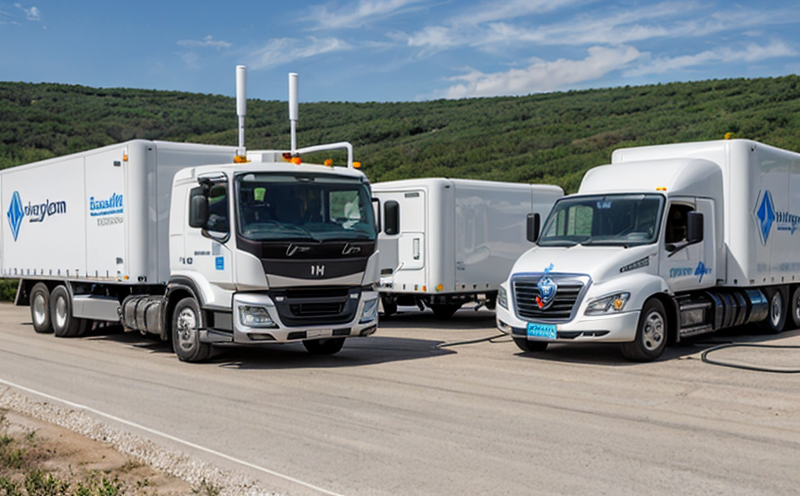SAE J2572 Hydrogen Leak Detection Testing
The SAE J2572 standard outlines a comprehensive procedure for testing hydrogen fuel systems and electrolysers to ensure they meet strict leak detection requirements. This service is critical in the energy sector, particularly as hydrogen technology continues to evolve and gain prominence. Compliance with this standard ensures that hydrogen fuel systems are safe and reliable, which is essential given the potential hazards associated with hydrogen leaks.
The SAE J2572 test protocol involves a series of steps designed to identify and quantify any unintended release of hydrogen gas from a system under specified conditions. This testing process can help manufacturers, researchers, and quality managers understand how well their systems perform in real-world scenarios where leaks might occur due to manufacturing defects or operational wear.
The testing procedure typically begins with the preparation of the specimen according to specific guidelines outlined by SAE J2572. Proper specimen preparation is crucial for accurate leak detection results. Following this, the test chamber is pressurized, and a leak rate is measured using calibrated instruments that can detect minute leaks as low as 0.1 standard cubic centimeters per second (sccm).
The data collected during this testing process provides critical insights into the integrity of hydrogen fuel systems and electrolysers. This information is invaluable for quality assurance, safety compliance, and product reliability. By adhering to SAE J2572 standards, organizations can demonstrate their commitment to high-quality, safe, and reliable hydrogen technology.
Leak detection testing under SAE J2572 helps identify potential risks early in the development process, allowing for timely corrective actions. This proactive approach not only enhances product safety but also contributes positively to the reputation of the manufacturer or researcher involved in hydrogen technology development.
| Test Parameter | Description |
|---|---|
| Pressurization | The specimen is pressurized to simulate real-world operating conditions. |
| Leak Rate Measurement | The leak rate is measured using calibrated instruments capable of detecting leaks down to 0.1 sccm. |
- Pressurization: Ensures that the specimen behaves under conditions similar to its operational environment.
- Leak Rate Measurement: Provides precise data on the amount of hydrogen escaping from the system, highlighting any weaknesses in design or construction.
Industry Applications
The SAE J2572 Hydrogen Leak Detection Testing is widely used across various industries that are heavily reliant on hydrogen technology. These include transportation, renewable energy generation, and industrial processes where hydrogen plays a crucial role.
- Transportation: This test ensures the safety of hydrogen fuel cell vehicles by confirming the integrity of their fuel systems. It helps in identifying any potential leaks that could compromise vehicle performance or safety.
- Renewable Energy Generation: Hydrogen generated from renewable energy sources is critical for sustainable power generation. Leak detection testing under SAE J2572 ensures these systems are leak-free, enhancing their efficiency and reliability.
- Industrial Processes: In industries where hydrogen is used in manufacturing processes, this test helps maintain operational safety by ensuring that there are no unintended releases of hydrogen gas.
| Sector | Application |
|---|---|
| Renewable Energy Generation | Testing the integrity of electrolyzers used in hydrogen production |
| Transportation | Ensuring safety and reliability of fuel cell vehicles |
| Industrial Processes | Maintaining operational safety in hydrogen-based manufacturing processes |
Customer Impact and Satisfaction
The implementation of SAE J2572 Hydrogen Leak Detection Testing significantly enhances customer satisfaction by ensuring that the products they purchase are safe, reliable, and compliant with international standards. This service is particularly beneficial for quality managers, compliance officers, R&D engineers, and procurement teams who rely on accurate testing data to make informed decisions.
By leveraging our state-of-the-art facilities and experienced technical staff, we provide customers with the highest level of assurance that their hydrogen fuel systems and electrolysers meet stringent leak detection requirements. Our commitment to precision and accuracy ensures that every test conducted aligns with industry best practices as outlined in SAE J2572.
The results from these tests play a pivotal role in the development, certification, and deployment of safe hydrogen technology solutions. Customers can trust us to deliver reliable testing services that contribute to their overall business success by reducing risks associated with leaky systems and enhancing product performance.
Competitive Advantage and Market Impact
The SAE J2572 Hydrogen Leak Detection Testing service offers significant competitive advantages to organizations operating in the renewable energy sector. By providing accurate, reliable testing results that conform to international standards, we help our clients stay ahead of regulatory requirements and market trends.
- Regulatory Compliance: Ensuring compliance with SAE J2572 helps clients navigate complex regulatory landscapes more easily.
- Risk Mitigation: By identifying potential leaks early in the development process, we assist our clients in mitigating risks and improving product safety.
- Innovation Support: Our testing services support ongoing innovation by providing valuable data that can be used to improve hydrogen fuel system designs.
The market impact of this service is profound. It contributes to the overall advancement of hydrogen technology, promoting safer and more efficient energy solutions. By supporting industry leaders in meeting high standards, we help drive the adoption of cleaner technologies which are essential for addressing global environmental challenges.





